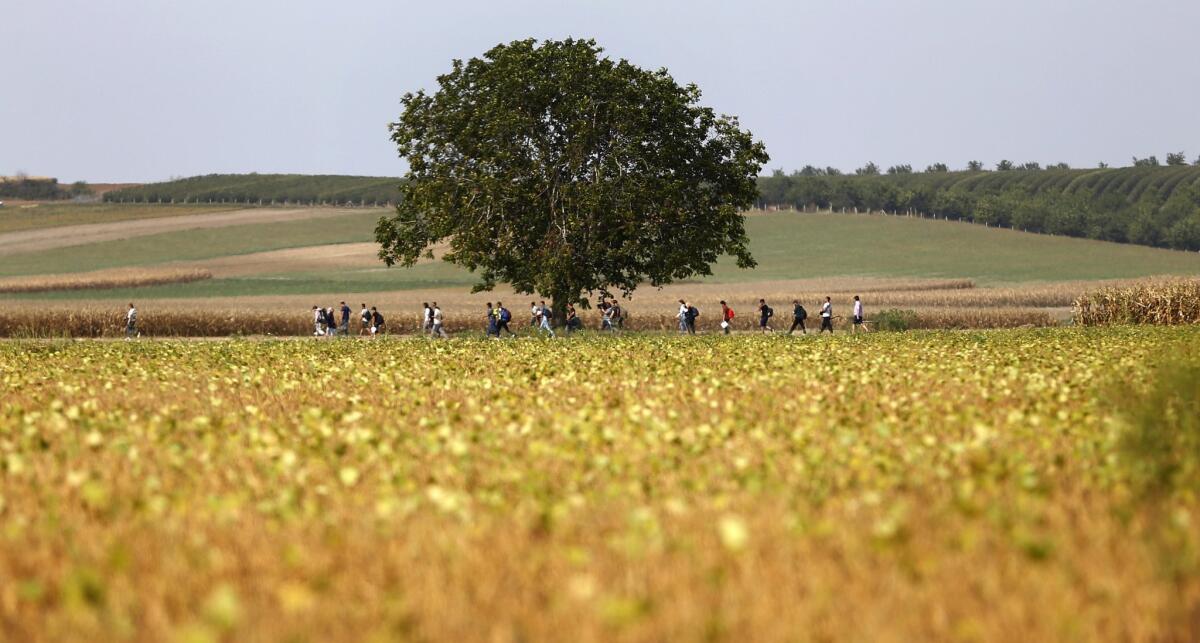Hungary’s border crackdown on refugees affecting neighboring nations

People make their way through fields at the border between Serbia and Croatia near Tovarnik, Croatia, on Wednesday.
- Share via
Reporting from London — Europe’s refugee crisis boiled over into violence Wednesday when Hungarian security forces unleashed water cannons and tear gas on asylum seekers who tried to break through a razor-wire fence preventing them from crossing the Hungary-Serbia border.
Hungarian authorities also continued to arrest people who sneaked across the frontier, enforcing a harsh new law making it a criminal offense to cross into the country without permission. Human rights groups denounced the crackdown and called anew for European leaders to come up with a coherent, unified response to the continent’s biggest migrant crisis since World War II.
The effects of Hungary’s decision to seal its border with Serbia quickly rippled out to its neighbors, as Southern European nations that had been little affected by the crisis braced for its spread.
Migrants searching for an alternative route to their preferred destinations of Germany and Scandinavia began crossing from Serbia into Croatia, which pledged to allow them safe passage. But Slovenia said it would impose temporary border controls along its frontier with Hungary, and Romania convened a meeting of senior defense officials to discuss taking in more refugees.
Despite Hungary’s clampdown and new border checks popping up throughout Europe, the relentless tide of asylum seekers from countries such as Syria, Iraq and Afghanistan showed no signs of abating.
Greek authorities reported Wednesday that 5,000 migrants had crossed into Macedonia within 24 hours, embarking on the well-trodden path to points north in the quest for sanctuary. Hundreds more people sailing to Greece from Turkey were plucked from the Aegean Sea by the Greek coast guard.
The bottleneck at the Hungary-Serbia border worsened as migrants who had not heard of the border’s closure continued to arrive. Conditions in the tent city that has sprung up at the frontier are dire: Some people are sleeping in the open, others walk miles in the sun to fetch food and water, and there are only 16 portable toilets, said Tirana Hassan of the human rights group Amnesty International.
“They’re tired, they’re hot. There are still people standing right now at the gate chanting” to be let through, Hassan said by telephone Wednesday from the Serbian border town of Horgos.
Tensions rose in the midafternoon when a group charged at the razor-wire fence that Hungary has erected along the length of its nearly 110-mile border with Serbia. Hungarian security forces responded with tear gas and water cannons, driving back angry protesters who hurled rocks. Women and children screamed and wept. Riot police were called in.
Officials in Budapest, the Hungarian capital, said authorities had acted properly in putting down what a spokesman described as an “armed mob,” but Hassan accused the Hungarian government of “making sure they’re sending a message of intimidation and force.”
Serbia protested the use of tear gas on its territory. Croatia also criticized Hungary’s tough approach.
“Barbed wire in Europe in the 21st century is not an answer,” Croatian Prime Minister Zoran Milanovic said. “It’s a threat.”
Milanovic told lawmakers Wednesday that 150 asylum seekers had already arrived in Croatia, the leading edge in what is likely to be a swelling wave.
“They will be able to pass through Croatia, and we are working intensively to enable that,” Milanovic said.
But transiting through Croatia adds a grim new danger for refugees who have already braved perilous sea and overland voyages to get that far: land mines left over from the Balkan wars of the 1990s. Several minefields dot the Croatia-Serbia border, and although officials say they are clearly marked, migrants trying to sneak across the frontier under cover of darkness might be caught unawares.
Elsewhere, the imposition of new border controls between Slovenia and Austria and between Slovenia and Hungary added to the extraordinary rollback of free movement within the European Union, one of the bloc’s most important achievements.
Germany, which began the wave of emergency border checks, said that they were succeeding in better regulating the inward flow of asylum seekers. Although Berlin insists it will fulfill its pledge of accepting up to 800,000 refugees this year, the speed with which they are arriving has overwhelmed some German cities, especially in the south.
Follow @HenryHChu on Twitter for coverage of Europe.
MORE ON EUROPE’S MIGRANT CRISIS
Refugees or migrants? It’s a crucial distinction
Hungary shuts border crossings, triggering standoff with stranded migrants
A shameful response in Europe to the refugee crisis in North Africa and Mideast
More to Read
Sign up for Essential California
The most important California stories and recommendations in your inbox every morning.
You may occasionally receive promotional content from the Los Angeles Times.














